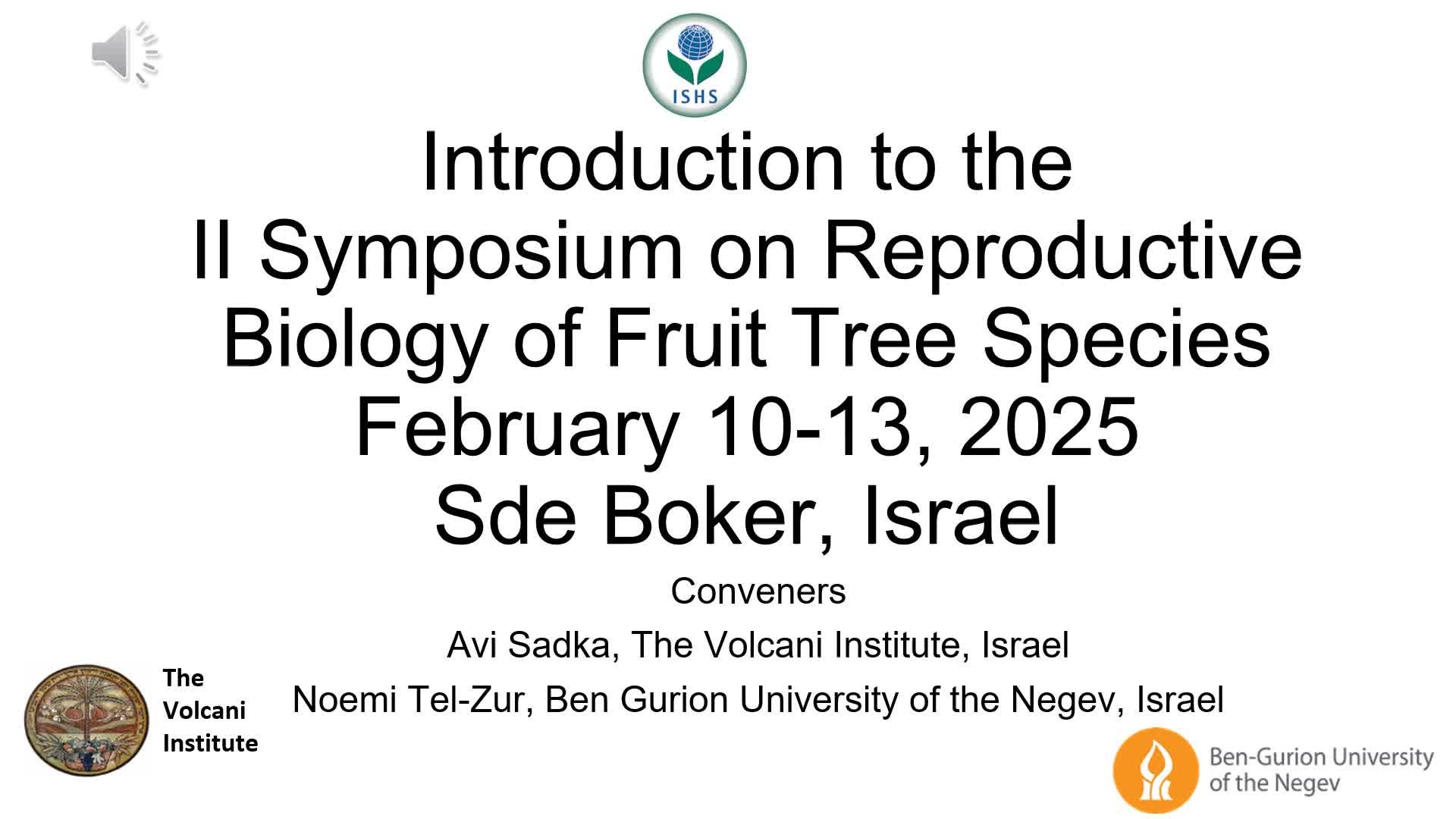II International Symposium on Reproductive Biology of Fruit Tree Species

Practical Information
February 10-13, 2025 Jacob Blaustein Institutes for Desert Research Sde Boqer, Israel
Important Dates:
- Start of abstract submission:June 1, 2024
- Deadline for abstract submission:September 15, 2024
- Deadline for abstract modification, if required:November 21, 2024
- Deadline for full text paper submission:December 15, 2024
- Deadline for full text paper modification:January 15, 2025
- Start of abstract submission:June 1, 2024
- Deadline for abstract submission:December 15, 2024
- Deadline for abstract modification, if required:January 15, 2025
Symposium Topics:
- Dormancy
- Flower Development
- Flower Induction
- Fruit Set
- Fruit Survival/Abscission
- Horticultural Practices to Maintain Optimal Bearing
- Non-Regular Bearing
- Pollination/Self-Incompatibility
- Sex Determination
- Modelling of the Above Processes
Conveners:
- Avi Sadka, The Volcani Institute (ARO)
- Noemi Tel-Zur, Ben-Gurion University of the Negev (BGU)
Local Organizing Committee:
- Michal Akerman, MIGAL Galilee Research Institute
- Giora Ben-Ari, The Volcani Institute
- Omer Crane, MIGAL Galilee Research Institute
- Arnon Dag, The Volcani Institute
- Martin Goldway, MIGAL Galilee Research Institute
- Vered Irihimovitch, The Volcani Institute
- Avi Sadka, The Volcani Institute
- Alon Samach, The Hebrew University of Jerusalem
- Or Sperling, The Volcani Institute
- Ilana Stein, Ariel University
- Noemi Tel-Zur, Ben-Gurion University of the Negev
- Michele Zaccai, Ben-Gurion University of the Negev
- Anat Zisovitz, Extension Service, Ministry of Agriculture and Rural Development
International Scientific Committee:
- Alessandro Botton, University of Padova, Italy
- Carlos Mesejo Conejos, Universitat Politècnica de València, Spain
- Evelyne Costes, INRAE, France
- Henryk Flachowsky, Julius Kühn-Institut, Germany
- Thomas Kon, NC State University, North Carolina, USA
- Eike Luedeling, University of Bonn, Germany
- Encarnación Ortega, CEBAS-CSIC, Spain
- Susanna Bartolini Scuola, Superiore Sant'anna, Pisa, Italy
- Harley Smith, CSIRO Agriculture & Food, Australia
- Erika Varkonyi-Gasic, The Institute for Plant and Food Research Limited, New Zealand
- Hisayo Yamane, Kyoto University, Japan
Abstract Submission Information and Link:
Graduate Students Special Funding
Special funding, generously donated by the Monselise-Bar Akiva Memorial Fund, has been allocated to partially cover the registration fees and accommodations of about 10 students.
Request for funding should be emailed to both conveners, Avi Sadka AND Noemi Tel-Zur, no later than September 10, 2023.
Avi Sadka: vhasadka@volcani.agri.gov.il
Noemi Tel-Zur: telzur@bgu.ac.il
Keynote Speakers (partial list)
Brunella Morandi
Associate Professor, Department of Agricultural and Food Sciences, University of Bologna, Italy
Prof. Morandi's research focuses on the fruit growth mechanisms of different crops and the effects of the environment on fruit tree physiology with the aim to develop new strategies to improve fruit quality in temperate fruit crops, especially in conditions of water scarcity and increased evapotranspiration due to climate change. She is currently involved in national and international projects addressing issues related to sustainable fruit production, fruit quality and water use efficiency.
Eike Luedeling
Head of Department Department of Horticultural Sciences, University of Bonn, Germany
Prof. Luedeling teaches and performs research in horticultural sciences, with particular focus on fruit tree dormancy and holistic systems modeling. Having worked at the World Agroforestry Centre in Nairobi, Kenya for 8 years, and at the Center for Development Research (ZEF) in Bonn for 4 years, he also remains interested in agroforestry and agricultural development. His research interests include climate change impacts on temperate fruit trees, as well as multifunctional agroforestry system.
Erika Varkonyi-Gasic
Science Team Leader, Plant and Food Research in Auckland, New Zealand
Dr. Varkonyi-Gasic has been studying the molecular mechanisms that regulate flowering, focusing on the application of biotechnology for faster breeding of horticultural woody perennials. As a result of the work of her and her team at Plant and Food Research, gene editing was established in kiwifruit, and this is now used to study flower induction and development, sex determination, and regulation of growth and dormancy cycles, in order to generate plants better suited for the changing climate.
Evelyne Costes
Director of Research at National Institute for Agronomic Research (INRAE)
Dr. Costes is currently the Referent scientist for Europe at INRAE BAP Department as well as the Deputy Director of "AGAP Institut" in charge of plant development and adaptation. Her experience is in tree architecture and development, tree flowering and phenology, tree physiology, quantitative genetics, and statistics and modeling.
Tom Bennett
Associate Professor in Plant Signalling and Development, University of Leeds, United Kingdom
Prof. Bennett is a developmental biologist and geneticist, interested in understanding how long-distance signalling within the plant body allows growth and development to be precisely regulated in both space and time. His current research group currently focuses on two main themes: on the coordination of reproductive shoot architecture and floral duration by hormonal signals and feedback from developing fruit, and on the mechanisms by which plants sense their neighbours' roots, and how this impacts shoot development.
Discover More About the Event
Sponsorship Opportunities

Sponsorship Opportunities
There are a variety of sponsorship opportunities available for the conference. Enter here to learn more.
Learn More